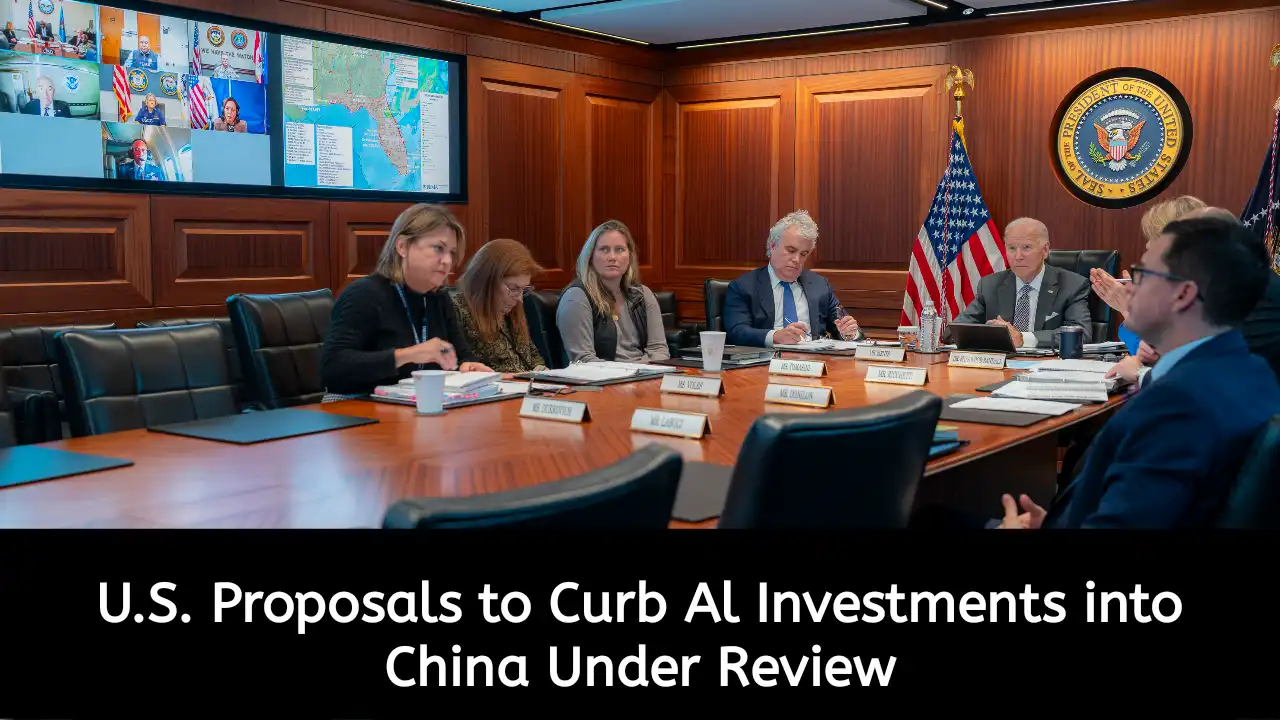U.S. Proposals to Curb AI Investments: As global competition in artificial intelligence (AI) intensifies, the U.S. government is reevaluating its stance on AI Investments in China, particularly in the burgeoning AI sector. This scrutiny arises from national security concerns and the desire to maintain technological superiority. The proposals aim to limit U.S. investments in Chinese AI firms, reflecting a broader strategy to counteract China’s growing influence and capabilities in technology.
The Context of U.S.-China Relations
The relationship between the U.S. and China has been characterized by both cooperation and tension, especially in technology and trade. Over the past few years, the U.S. has grown increasingly wary of China’s technological advancements, particularly in AI, which has significant implications for national security and economic stability. The U.S. government is concerned that investments in Chinese AI firms could lead to the transfer of sensitive technology, enhancing China’s military and surveillance capabilities.
Current Proposals and Their Implications
The proposed measures include restrictions on U.S. firms investing in Chinese AI startups and an evaluation of existing partnerships. These restrictions could involve:
- AI Investment Bans: U.S. firms may face outright bans on AI investments in certain Chinese AI companies deemed critical to national security.
- Enhanced Scrutiny: Investments in AI firms with ties to the Chinese government or military could be subject to more rigorous review processes.
- Collaboration Limitations: U.S. companies might be restricted from engaging in joint ventures or collaborations with Chinese firms in specific AI sectors.
The proposals are still under review, and the Biden administration is weighing the potential economic repercussions against the need for national security measures.
National Security Concerns
The primary motivation behind these proposals is to protect U.S. national security interests. AI technology has vast applications, including military, intelligence, and surveillance uses. The U.S. government fears that AI investments in China could bolster its adversaries’ capabilities, potentially leading to an arms race in AI technologies.
Furthermore, the rise of AI-driven surveillance technologies in China has raised alarms. The Chinese government has been known to employ AI for mass surveillance and social control, prompting concerns that U.S. investments could indirectly support these activities.
Economic Considerations
While national security is a primary concern, the economic implications of restricting AI investments in China cannot be overlooked. The AI sector is a significant driver of innovation and economic growth. Limiting access to Chinese markets could hinder U.S. companies’ ability to collaborate with leading AI researchers and companies, potentially stifling innovation at home.
Moreover, the global tech landscape is interconnected. Many U.S. firms have established partnerships and investments in Chinese tech, and pulling back could have cascading effects on these relationships and the broader tech ecosystem.
Responses from Industry Leaders
The proposals have elicited mixed reactions from industry leaders and experts. Some support the government’s efforts to safeguard national security, emphasizing the need to protect sensitive technologies. Others argue that restricting investments could be counterproductive, as it may push U.S. companies to innovate less vigorously or miss opportunities for collaboration that could yield significant advancements.As the United States reviews proposals to limit investments in Chinese AI companies, experts are voicing concerns about the potential impact on global cooperation in technology.
“China and the US are the leaders in terms of AI development, and companies of the two countries have maintained cooperation in certain areas, which is conducive to the development and adoption of AI,” said Li Yong, a senior research fellow at the China Association of International Trade. He cautioned that “U.S. politicians’ discriminatory restrictions will undermine such cooperation and the global development of AI and other technologies.”
The proposed measures aim to address national security concerns but could hinder collaborative efforts that have fueled innovation. As both nations strive for technological supremacy, experts argue that fostering cooperation rather than imposing restrictions may be crucial for the future of AI development.
The global tech community is closely monitoring these developments, emphasizing the need for dialogue and collaboration to ensure sustainable growth in artificial intelligence and other emerging technologies.
Industry advocates stress the importance of maintaining open channels of communication and collaboration in global technology development while ensuring that national security interests are prioritized.
International Dynamics Regarding AI Investment
The proposed restrictions on investments also highlight a shift in how countries approach technology and security in an increasingly multipolar world. As nations vie for leadership in AI, the U.S. is compelled to reassess its strategies to ensure it remains at the forefront of technological innovation.
Countries in Europe and Asia are watching closely as they navigate their relationships with both the U.S. and China. They face similar dilemmas regarding AI investments in technology and the balance between economic opportunity and security concerns.
Conclusion
The U.S. proposals to curb AI investments in China are indicative of a broader strategy to navigate the complexities of national security in an interconnected global economy. As these proposals undergo review, the outcomes will have lasting implications for U.S.-China relations, the global tech landscape, and the future of AI innovation. Balancing security needs with economic interests will be a crucial challenge for policymakers in the coming years. As the world watches, the decisions made will shape the trajectory of AI development and international collaboration for years to come.

